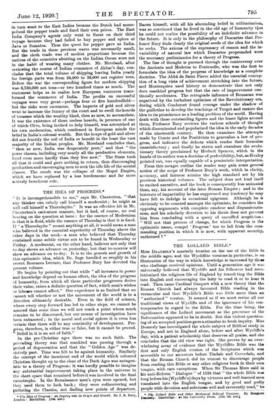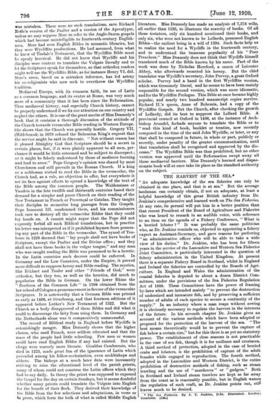THE LOLLARD BIBLE.*
Miss DEANZSLY'e masterly treatise on the use of the Bible in the middle ages, and the Wyoliffite versions in particular, is an
illustration of the way in which knowledge is increased by thou who challenge received opinions. Until a generation ago it was universally believed that Wycliffe and his followers had revo-
lutionized the religious life of England by transit ting the Bible into English and encouraging the laity to read it or to hear It read. Then came Cardinal Gasquet with a new theory that the Roman Church had always favoured Bible reading in the vernacular and that Wycliffe's Bible was little more than an " authorized " version. It seemed as if we must revise all our traditional views of Wycliffe and of the ignorance of his con- temporaries in regard to the Bible. For the time being, the 'significance of the Lollard movement as the precursor of the Reformation appeared to be in doubt. But this violent question. ing of an accepted position gave a stimulus to fresh inquiry. Miss Deanesly has investigated the whole subject of Biblical study in Europe, and not in England alone, before and after Wycliffe's day, with a patient scholarship that deserves all praise, and she concludes that the old view was right. She proves by an over- whelming array of evidence that the Wyoliffite Bible was the first and only English version of the Scriptures which was accessible to our ancestors before Tindale and Coverdale, and that the Roman Church did its utmost to discourage people from reading this Bible or any other religious book in their own tongue, with rare exceptions. When Sir Thomas More said in his anti-Reform " Dialogue " of 1528 that " the whole Bible was long before his [Wycliffe's] days by virtuous and well-learned men translated into the English tongue, and by good and godly people with devotion and soberness well and reverently read," he • The Lollard Bible and Other Mediaeval Biblical Panama. By ]firgiani Boanesty. Cambridge : at the University Press. [81o. 6d. net.'
was mistaken. There wore no such translations, save Richard Rolle's version of the Psalter and a version of the Apocalypse, unless we may suppose More to refer to the Anglo-Saxon gospels which had become unintelligible to fourteenth-century English- men. More had seen English Bibles in monastic libraries, but
they were Wycliffite productions. He had assumed, from what
he knew of Tindale's Testament, that the Wycliffite Bible must be openly heretical. He did not know that Wycliffe and his disciples were content to translate the Vulgate literally and to let the Scriptures speak for themselves, so that orthodox readers might well use the Wycliffite Bible, as for instance Henry VI. did.
More's error, based on a mistaken inference, has led astray his co-religionists who now seek to overthrow the Wycliffite tradition.
Mediaeval Europe, with its common faith, its use of Latin as a common language, and its centre at Rome, was very much more of a community than it has been since the Reformation.
Thus mediaeval history, and especially Church history, cannot be properly understood if we fix our attention on one country and neglect the others. It is one of the great merits of Miss Deanesly's book that it contains a thorough discussion of the attitude of the Church towards vernacular Bible reading in Western Europe. She shows that the Church was generally hostile. Gregory VII.
(Hildebrand) in 1079 refused the Bohemian King's request that the service might be said in Slavonic. " Not without reason has
it pleased Almighty God that Scripture should be a secret in certain places, lest, if it were plainly apparent to all men, per- chance it would be little esteemed and be subject to disrespect ; or it might be falsely understood by those of mediocre learning and lead to error." Pope Gregory's opinion was shared by most Churchmen and still prevails in the Roman Church. If a king or a nobleman wished to read the Bible in the vernacular, the Church had, as a rule, no objection to offer, but everywhere it set its face against efforts to spread a knowledge of the text of the Bible among the common people. The Waldensians or Vaudois in the late twelfth and thirteenth centuries based their demand for a simpler and purer Church on their reading of the New Testament in French or Provencal or Catalan. They taught their disciples to memorize long passages from the Gospels. Pope Innocent III. condemned them, and his commissioners took care to destroy all the vernacular Bibles that they could lay hands on. A casuist might argue that the Pope did not expressly forbid all such Biblical translations, but in practice his letter was interpreted as if it prohibited laymen from possess- ing any part of the Bible in the vernacular. The synod of Tou- louse in 1229 decreed that " lay people shall not have books of Scripture, except the Psalter and the Divine office ; and they shall not have these books in the vulgar tongue," and any man who was caught reading the Bible was presumed to be a heretic. In the Latin countries such decrees could be enforced. In Germany and the Low Countries, under the Empire, it proved more difficult to suppress heresy and Bible reading. The mystics, like Eckhart and Tauler and other " Friends of God," were orthodox, but they too, as well as the heretics, did much to popularize the Bible in German. On the lower Rhine the " Brethren of the Common Life " in 1398 obtained from the law school of Cologne a pronouncement in favour of the vernacular Scriptures. It is noteworthy that a German Bible was printed as early as 1466, at Strasbourg, and that fourteen editions of it appeared before Luther's New Testament of 1522. But the Church as a body disapproved of these Bibles and did what it could to discourage the laity from using them. In Germany and the Netherlands alone was it comparatively unsuccessful.
The record of Biblical study in England before Wycliffe is astonishingly meagre. Miss Dedncsly shows that the higher classes, who used French, were seldom educated and that the mass of the people had little schooling. Few men or women could have read English Bibles if any had existed. But the clergy were scarcely more literate. Giraldus Cambrensis, who died in 1223, made great fun of the ignorance of Latin which prevailed among his fellow-ecclesiastics, even archbishops and abbots. The bishops at a much later date were incessantly striving to raise the educational level of the parish priests, many of whom could not construe the Latin offices which they had to say daily. In theory the priest was supposed to expound the Gospel for the day on certain Sundays, but it seems doubtful whether many priests could translate the Vulgate into English for the benefit of their flock. They derived their knowledge of the Bible from the few selections and adaptations, in verse er In prose, which form the bulk of what is called Middle English
literature. Miss Deanesly has made an analysis of 7,578 wills, all earlier than 1526, to illustrate the scarcity of books. Of all these testators, only six hundred, mentioned their books, and only six, who were not known to be Lollards, possessed English Bibles—the earliest being in a will of 1394. Such facts help us to realize the need for a Wycliffe in the fourteenth century, and to understand the immense popularity of his " Poor Preachers." Miss Deanesly does not think that Wycliffe himself translated much of the Bible known by his name. Part of the work was done by Nicholas Hereford, a canon of Leicester Abbey, who afterwards recanted his heresy. But the chief translator was Wycliffe's secretary, John Purvey, a great Oxford scholar. Purvey had a hand in the first Wycliffite version, which was tiresomely literal, and he seems to have been mainly responsible for the second version, which was more idiomatic, and for the Wycliffite Prologue. This Bible at once became highly popular, and nearly two hundred manuscript copies survive. Richard II.'s queen, Anne of Bohemia, had a copy of the Wycliffite Gospels. But the Church, after checking the growth of Lollardy, did its best to suppress the Lollard Bible. A provincial council at Oxford in 1408, at the instance of Arch- bishop Arundel, forbade anyone to translate the Bible or to " read this kind of book, booklet or treatise, now recently composed in the time of the said John Wycliffe, or later, or any that shall be composed in future, in whole or part, publicly or secretly, under penalty of the greater excommunication, until that translation shall be recognized and approved by the dio- cesan." The Wycliffite Bible was thus prohibited, but no other version was approved until the Reformation swept away all these mediaeval barriers. Miss Deanesly's learned and dispas- sionate book will at once take its place as the standard authority on the subject.







































 Previous page
Previous page